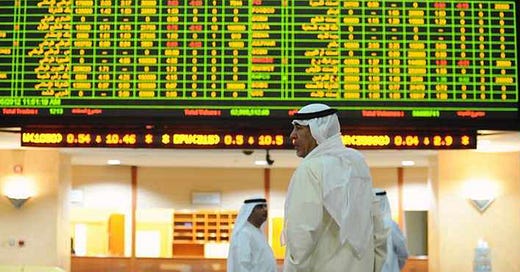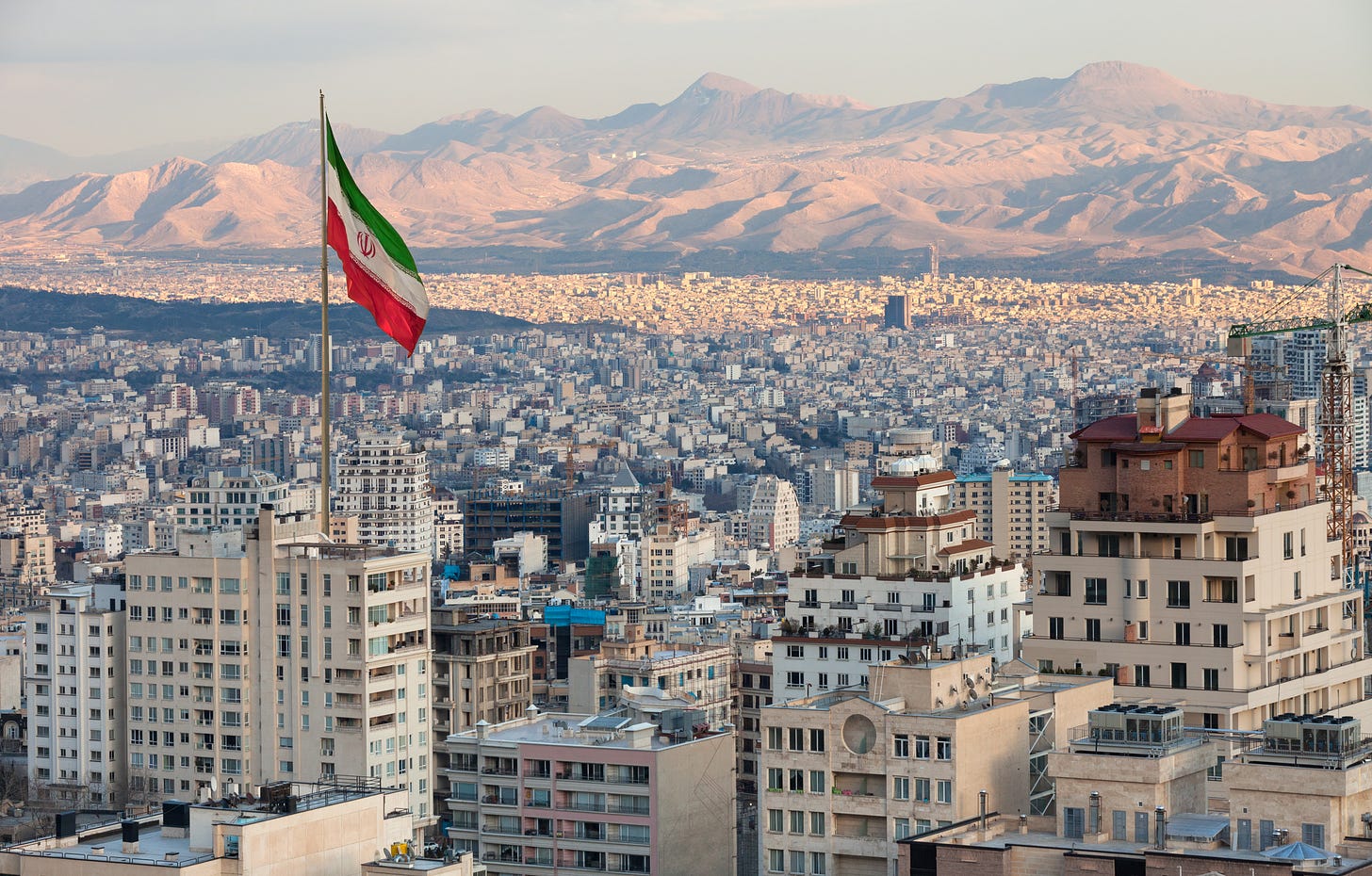Emerging Markets Daily - July 9
Mubadala Raises $731M in Abu Dhabi IPO, China Sees Didi IPO as Deliberate Deceit, US Worried Iran Deal Time Running Out, DP World and Africa, China Inflation Cools
The Top 5 Emerging Markets Stories from Global Media - July 9
Mubadala Raises $731 Million for Satellite Operator, Yahsat, IPO
Bloomberg
“Abu Dhabi sovereign fund Mubadala Investment Co. has raised 2.7 billion dirhams ($731 million) in an initial public offering of satellite operator Yahsat after pricing shares near the middle of a marketed range.”
“A subsidiary of the fund sold 975.9 million shares in Yahsat, which trades under the name Al Yah Satellite Communications Co., for 2.75 dirhams each, according to a statement Friday, after marketing them for between 2.55 dirhams and 3.05 dirhams each.”
“The share sale is the second largest on record in Abu Dhabi, after Abu Dhabi National Oil Co. for Distribution PJSC raised $850.8 million in a 2017 offering, according to data compiled by Bloomberg. It is also the first IPO in Abu Dhabi since that listing.”
“The IPO gives Yahsat a market value of about 6.7 billion dirhams, according to the statement. Yahsat will remain majority owned by Mubadala after the listing. The offering was multiple times oversubscribed and attracted interest from ‘high quality, global institutional investors allowing for increased foreign direct investment into the UAE,’ according to the statement. The Emirates Investment Authority subscribed to 5% of the final offer size.” Nicolas Parasie reports.
China Regulators See Didi New York IPO as Deliberate Act of Deceit
South China Morning Post (Exclusive)
“China’s government regulators suspect that the June 30 initial public offering by Didi-Chuting in New York was a deliberate act of deceit, a characterisation that underscores the severity of the fundraising exercise and the potential storm to come, according to four sources familiar with the matter.”
“The Beijing-based ride-hailing service raised US$4.4 billion in a stock sale in the US even while its core business is in China – where it dominates 90 per cent of the market.”
“Some officials are privately describing Didi’s move as ‘yang feng yin wei’ – to comply publicly, but defy privately – according to a source who was briefed, speaking on condition of anonymity for describing confidential internal discussions.” South China Morning Post reports.
Geopolitics: US Worries Time Running Out On Iran Nuclear Deal
Bloomberg
“President Joe Biden’s team is beginning to grapple with the possibility that the 2015 nuclear accord with Iran he promised to revive may soon be beyond saving.”
“Hopes for a quick re-entry to the accord that Donald Trump abandoned have dimmed after six rounds of negotiations in Vienna, with little sign of when a seventh might start. The stalemate is compounded by Iran’s technological advances and the election of a new hard-line president, raising doubt about whether the agreement reached in 2015 would be sufficient to constrain the country’s nuclear ambitions anymore.”
“This week provided another example of just how far Iran has advanced in the three years since then-President Trump renounced the Joint Comprehensive Plan of Action in 2018 and began his “maximum pressure” campaign with its array of sanctions. On Tuesday, the International Atomic Energy Agency reported that Iran has taken steps to make metal fuel plates with uranium it has enriched to 20% purity. That’s banned by its deal with world powers and marks a significant step toward production of a nuclear bomb.”
“The more knowledge Iran gains, ‘the more difficult it becomes to ensure that the JCPOA can be the same bulwark against nuclear weapons development as it was in 2015,’ said Kelsey Davenport, director for nonproliferation at the Arms Control Association. ‘It’s a dangerous game. Iran is putting the Vienna talks at risk by pursuing nuclear activities that cannot be fully reversed.’” Nick Wadhams reports.
DP World Cements Position as ‘Gateway to Africa’
African Business
“UAE port operator DP World has offered to buy up 12.7bn rand ($890 million) worth of shares in South Africa’s Imperial Logistics. The deal will create a sprawling network of inter-continental trade lanes for African producers across land, sea and economic zones, DP World said.”
“‘DP World aims to improve connectivity between African producers along fast-growing trade lanes to the rest of the world.’ DP World said the acquisition will also help to cement its position as a ‘Gateway to Africa’ for transporting cargo.”
“‘The acquisition of Imperial will help DP World to build better and more efficient supply chains for the owners of cargo, especially in Africa. Imperial’s operations are complementary to our network of ports, terminals and logistics operations on the continent,’ said Sultan Ahmed Bin Sulayem, Group Chairman and CEO, DP World.”
“The company, owned by the government of Dubai, added that the takeover of Imperial’s logistics and market access, seals its transformation into an ‘advanced logistics company’ with a more diversified and integrated portfolio.”
“DP World, which handles 10% of the world’s container traffic, is betting big on the African continent. In May 2016, it signed a $442m agreement with the government of Somaliland, to operate a regional trade and logistics hub at the Port of Berbera, which recently opened the first phase of its expansion.”
“The port, based on the geo-strategically important Gulf of Aden, is a maritime corridor for up to 20% of global trade annually, including a considerable chunk of the Gulf’s oil and gas exports, experts say.” Shoshana Kedem reports.
China Inflation Cools, Beijing Worries Economy Is Losing Heat
Wall Street Journal
“After a year long run-up that pushed producer inflation to the highest level in more than a decade, China’s factory-gate prices rose at a slightly slower pace in June, raising hopes among economists that inflation in the world’s second-largest economy may have hit a turning point.”
“China’s producer-price index rose 8.8% in June from a year earlier, edging down from May’s year-over-year surge of 9.0%, the National Bureau of Statistics said Friday. The reading was in line with forecasts from economists polled by The Wall Street Journal. It was the first time the figure declined from the previous month since last October…”
“Higher vaccination rates and the lifting of lockdowns in many Western countries are expected to boost consumers’ spending on services, such as travel and dining out, as they spend less on physical goods, which will likely weaken demand for Chinese-made products.”
“Facing a potential slowdown, China’s State Council, the country’s cabinet, said Wednesday that authorities should use monetary-policy tools, such as cutting the reserve requirement ratio for banks, to offset the negative impact of rising raw material prices. It stressed that policy makers should avoid ‘flood-like’ stimulus and said such actions should be taken at ‘a proper time,’ without providing a timeline.”
“Economists have widely interpreted the statement as a signal that China’s leaders are concerned about a moderation in economic activity in June, though the possible cut in the amount of reserves that banks must hold will likely only target smaller enterprises, which are believed to be hurting more than their larger counterparts. China last lowered the reserve ratio in April 2020, near the height of the pandemic’s impact on the economy.” Stella Yifan Xie reports.




